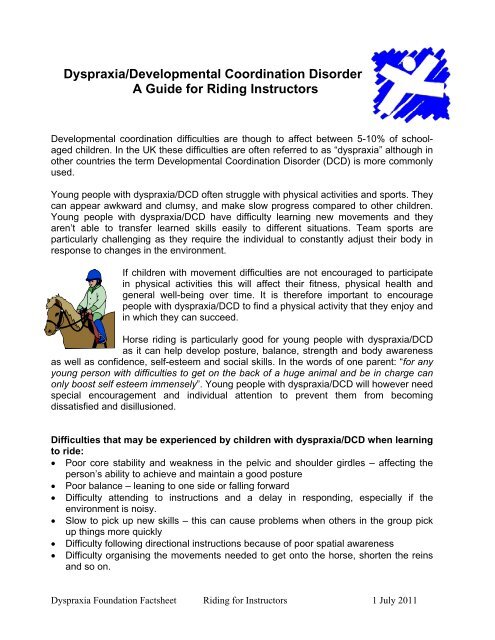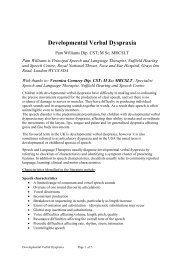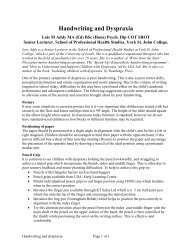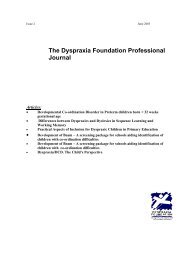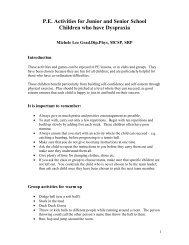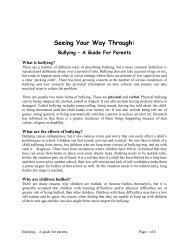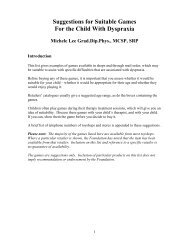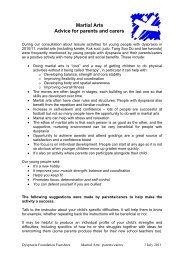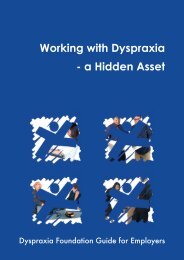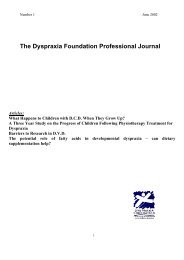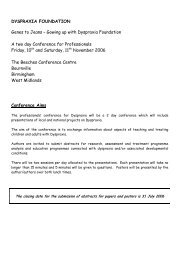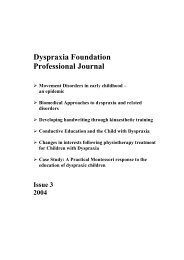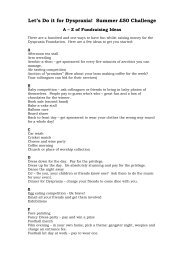advice for riding instructors - Dyspraxia Foundation
advice for riding instructors - Dyspraxia Foundation
advice for riding instructors - Dyspraxia Foundation
Create successful ePaper yourself
Turn your PDF publications into a flip-book with our unique Google optimized e-Paper software.
<strong>Dyspraxia</strong>/Developmental Coordination Disorder<br />
A Guide <strong>for</strong> Riding Instructors<br />
Developmental coordination difficulties are though to affect between 5-10% of schoolaged<br />
children. In the UK these difficulties are often referred to as “dyspraxia” although in<br />
other countries the term Developmental Coordination Disorder (DCD) is more commonly<br />
used.<br />
Young people with dyspraxia/DCD often struggle with physical activities and sports. They<br />
can appear awkward and clumsy, and make slow progress compared to other children.<br />
Young people with dyspraxia/DCD have difficulty learning new movements and they<br />
aren’t able to transfer learned skills easily to different situations. Team sports are<br />
particularly challenging as they require the individual to constantly adjust their body in<br />
response to changes in the environment.<br />
If children with movement difficulties are not encouraged to participate<br />
in physical activities this will affect their fitness, physical health and<br />
general well-being over time. It is there<strong>for</strong>e important to encourage<br />
people with dyspraxia/DCD to find a physical activity that they enjoy and<br />
in which they can succeed.<br />
Horse <strong>riding</strong> is particularly good <strong>for</strong> young people with dyspraxia/DCD<br />
as it can help develop posture, balance, strength and body awareness<br />
as well as confidence, self-esteem and social skills. In the words of one parent: “<strong>for</strong> any<br />
young person with difficulties to get on the back of a huge animal and be in charge can<br />
only boost self esteem immensely”. Young people with dyspraxia/DCD will however need<br />
special encouragement and individual attention to prevent them from becoming<br />
dissatisfied and disillusioned.<br />
Difficulties that may be experienced by children with dyspraxia/DCD when learning<br />
to ride:<br />
• Poor core stability and weakness in the pelvic and shoulder girdles – affecting the<br />
person’s ability to achieve and maintain a good posture<br />
• Poor balance – leaning to one side or falling <strong>for</strong>ward<br />
• Difficulty attending to instructions and a delay in responding, especially if the<br />
environment is noisy.<br />
• Slow to pick up new skills – this can cause problems when others in the group pick<br />
up things more quickly<br />
• Difficulty following directional instructions because of poor spatial awareness<br />
• Difficulty organising the movements needed to get onto the horse, shorten the reins<br />
and so on.<br />
<strong>Dyspraxia</strong> <strong>Foundation</strong> Factsheet Riding <strong>for</strong> Instructors 1 July 2011
How you can help<br />
• Have plenty of patience!<br />
• Encourage participation and fun and reward ef<strong>for</strong>t - certificates,<br />
rosettes and badges can really boost self-esteem<br />
• Choose a calm pony with a “smooth” action that is unlikely to<br />
make any unpredictable movements<br />
• Encourage the individual to spend time with the horse be<strong>for</strong>e you<br />
even think about getting on to ride. This will really help with<br />
confidence.<br />
• Provide a step <strong>for</strong> individuals who have difficulty mounting<br />
• Don’t tell the individual to “try harder” – they are already working twice as hard as<br />
their peers<br />
• Find out if the individual has any specific limitations or needs; <strong>for</strong> example tight<br />
hamstrings can make posting difficulty, causing pain and leading to the individual<br />
becoming disillusioned<br />
• In the early days, find somewhere with minimal distractions so that the individual can<br />
really focus on developing skills and confidence<br />
• Teach skills in smaller, manageable parts – lots of repetition is needed<br />
• Use of mirrors can help the individual to monitor their sitting posture<br />
• Provide side walkers as well as someone leading the reins until balance and<br />
confidence has improved.<br />
• Don’t expect perfection – individuals with dyspraxia may hold their hands and feet in<br />
positions that aren’t quite right. Try to strike a balance that you as the instructor and<br />
the person with dyspraxia are com<strong>for</strong>table with<br />
• Put up pictures around the <strong>riding</strong> area so you can tell the young person to go towards<br />
the “apple” or “Queen” rather than using left and right<br />
• Bear in mind that it might take longer <strong>for</strong> the young person with dyspraxia to learn to<br />
tack up. Give extra prompts and use picture reminders where necessary. This is good<br />
<strong>for</strong> developing manual dexterity so encourage the young person to persevere!<br />
• Encourage the young person to help with grooming and general horse care. This will<br />
really help their motor skills as well as boost their confidence.<br />
Useful link:<br />
Riding <strong>for</strong> the Disabled (RDA)<br />
http://www.<strong>riding</strong>-<strong>for</strong>-disabled.org.uk<br />
Further in<strong>for</strong>mation available from:<br />
<strong>Dyspraxia</strong> <strong>Foundation</strong>, 8 West Alley, Hitchin, Herts SG5 1EG<br />
Tel: 01462 454986 (Helpline) / 01462 455016 (Administration)<br />
Fax: 01462 455052 Email: dyspraxia@dyspraxiafoundation.org.uk<br />
Website: www.dyspraxiafoundation.org.uk<br />
© <strong>Dyspraxia</strong> <strong>Foundation</strong><br />
Registered charity no 1058352 A company limited by guarantee. Registered in England No 3256733<br />
<strong>Dyspraxia</strong> <strong>Foundation</strong> Factsheet Riding <strong>for</strong> Instructors 1 July 2011


